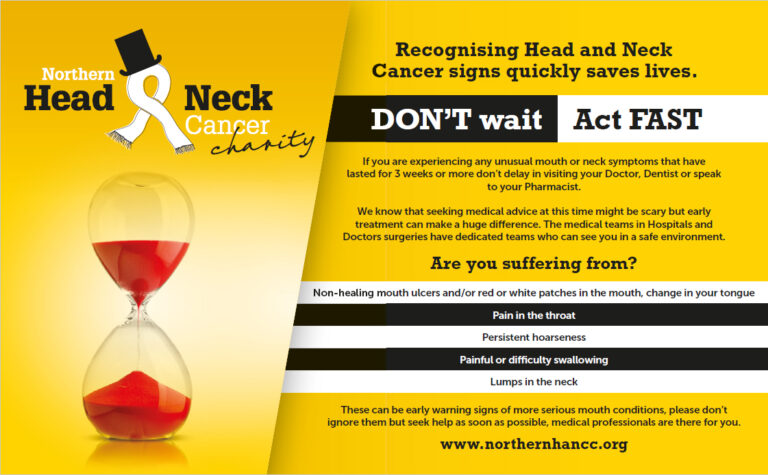Head and Neck Cancer
There are over 12,000 new cases of head and neck cancers in the UK every year, and around 4,100 deaths. It’s the 8th most common cancer in the UK.
The most common areas for cancer to develop are:
- mouth, lips and tongue
- voice box
- throat
- salivary glands
- nose and sinuses
Since the 1990s, cases of head and neck cancer have increased by over a third.
Men are twice as likely as women to develop head and neck cancer, although rates are increasing faster in females.
It is estimated that between 46% and 88% of all cases of head and neck cancer are preventable, but early detection is vital.
Symptoms
Getting symptoms checked early is vital to prevention and effective treatment.
If you experience any of these signs for 3 weeks or more, you should see a GP straight away:
- Mouth ulcers that don’t heal
- Red or white patches in your mouth
- Changes to your tongue
- Pain in your throat
- Persistent hoarseness (throat feeling scratchy or raspy and affecting speech)
- Pain or difficulty swallowing
- Lumps in your neck

The symptoms can be early warning signs; you should get them checked immediately.
More than half of new cases of head and neck cancer are diagnosed at a late stage, so please don’t ignore any of these symptoms.
Who is at risk?
There are many risk factors – some we can control and others we can’t.
Incidence is higher in older people, with a fifth of all cases being people over 75.
Tobacco smoke is another factor. It causes nearly 2 in 3 cases of cancer in the voice box.
There are also links to deprivation. People living in the poorest areas have double the rate of head and neck cancers than people in the least deprived areas.
